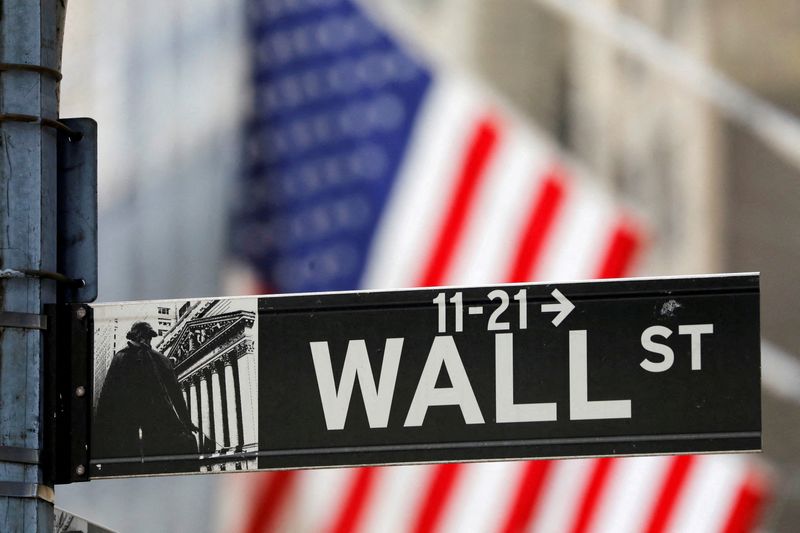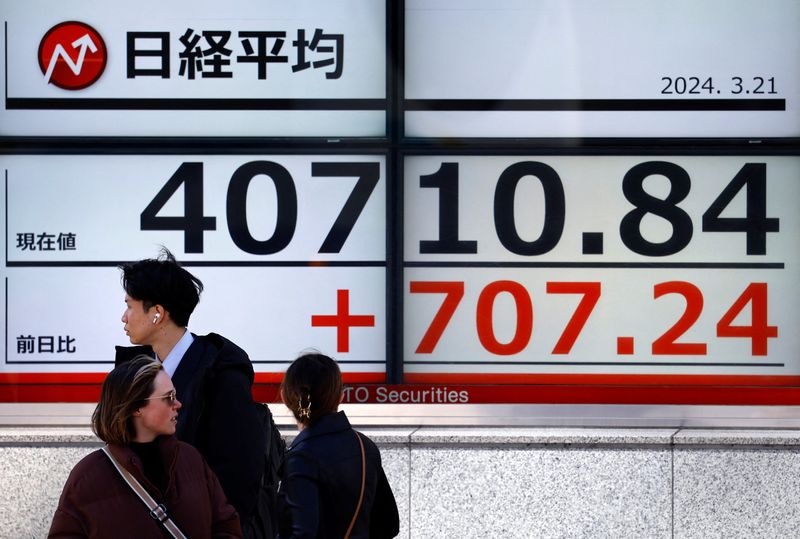By Herbert Lash and Harry Robertson
NEW YORK/LONDON (Reuters) -Global equity markets mostly faltered on Wednesday as investors await fresh inflation data to better assess the likelihood of Federal Reserve interest rate cuts, while the dollar edged higher on expectations of U.S. economic out-performance.
European stocks rose to a record high, boosted by company earnings, but stocks on Wall Street slid as a downbeat forecast from Uber (NYSE:UBER) knocked its shares down 5.7% and made the ride-hailing firm one of the biggest decliners on the S&P 500.
The yen weakened for a third day and kept investors wary of intervention from Japanese authorities, while crude oil edged up from near two-month lows. In Europe, the Swedish crown was under pressure after the central bank cut rates as expected and said two more cuts were likely this year if inflation remained mild.
The big concern among traders and investors is whether inflation is on course to reach the U.S. central bank's 2% target and when Fed Chair Jerome Powell might cut rates.
Fed Boston President Susan Collins said the U.S. economy needs to cool off as an avenue toward getting inflation back to the central bank's 2% target.
"The market is still very much waiting for the CPI report next Wednesday. We're basically stuck in a bit of a range here until we get data," said Gennadiy Goldberg, head of U.S. rates strategy at TD Securities in New York.
"Investors are still very cautious at this point. They don't want to over extrapolate from one data point or a couple of developments," he said.
MSCI's gauge of stocks across the globe fell 0.18%, while Europe's pan-regional STOXX 600 index rose 0.34% to a record close. On Wall Street, the Dow Jones Industrial Average rose 0.44%, the S&P 500 closed unchanged and the Nasdaq Composite slid 0.18%.
Global stocks fell sharply in April as strong U.S. economic data caused investors to rein in their bets on rate cuts from the Fed and, by extension, other major central banks this year.
Stocks, however, have rallied in May, partly encouraged by last week's nonfarm payrolls, which showed a cooling in the hot U.S. labor market but remained stronger than pre-pandemic data.
"Investors continue to underestimate or miscalculate interest rate cuts," said Michael Arone, chief investment strategist at the U.S. SPDR business at State Street (NYSE:STT) Global Advisors in Boston.
However, if the economy expands with inflation anchored and the labor market reasonably strong, "that makes for a pretty good backdrop for stocks," he said. "So unless some of those ingredients change, the markets will continue to do OK."
In currency markets, the yen dropped 0.61% to 155.64 per dollar even after Bank of Japan governor Kazuo Ueda said the central bank may take monetary policy action if currency falls affect prices significantly.
Japan has intervened to boost the currency from its lowest level in 34 years in recent days, according to traders and analysts, keeping the market alert for further swings.
The dollar index, which tracks the currency against six peers, rose 0.13% to 105.55 and was less than 1% below a 5-1/2 month high touched in April. The euro was down 0.09% at $1.0742.
U.S. Treasury yields have fallen in recent days as traders have moved to price back in two rate cuts from the Fed this year, having seen one as most likely in the middle of April. The 10-year yield, which moves inversely to its price, rose 3.7 basis points to 4.498%.
Oil prices edged higher after U.S. oil storage data showed a draw in crude stockpiles as refiners ramped up output ahead of the summer driving season.
U.S. crude rose 61 cents to settle at $78.99 a barrel and Brent settled up 42 cents at $83.58 per barrel.
Gold steadied as while investors awaited data for clues on potential Fed rate cuts, though a slight uptick in the dollar limited any upside.

U.S. gold futures for June delivery settled 0.1% lower at $2,322.30 per ounce.
Bitcoin fell 1.31% to $62,142.09.
